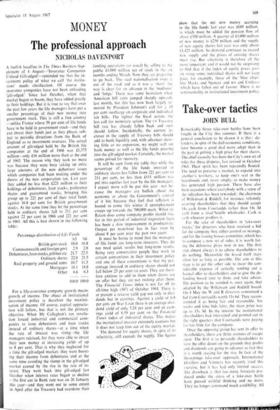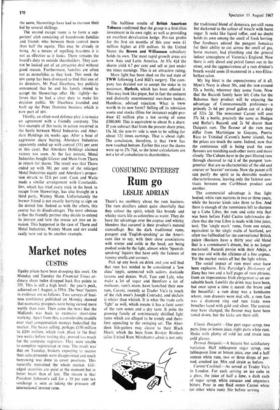Take-over tactics
JOHN BULL
Remarkably fierce take-over battles have been fought in the City this summer. If there is a general conclusion to be drawn it is this: de- fenders, in spite of the dull economic conditions, have become a good deal more adept than in the past at getting a high price for their shares. The chief casualty has been the City's own set of rules for these disputes, last revised in October 1963. Their spirit has been repeatedly flouted. The need to preserve a market, to expand into another's territory, to keep one's seat in the boardroom and, more simply, to make money has generated high passion. There have also been occasions where everybody with a sense of the ridiculous has been rewarded: the chairman of Wilkinson & Riddell, for instance, solemnly assuring shareholders that they should accept 14s cash from Courtaulds rather than I4s 3d cash from a rival °textile wholesaler. Cash is cash whoever proffers it.
For the sake of shareholders in 'take-over stocks,' for directors who have received a bid for the company they either control or manage, and for the issuing houses committee, which has to compose a new set of rules, it is worth list- ing the defensive ploys now in use. The first step almost always is to advise shareholders to do nothing. Meanwhile the board itself stays silent for as long as possible. The aim at this stage is to get the other side to incur the con- siderable expense of actually sending out a formal offer to shareholders and to give the de- fending board time to think and take advice. The position to be avoided is, once again, that adopted by the Wilkinson and Riddell board. On 4 May the W and R directors announced a bid from Courtaulds worth Ils 6d. They recom- mended it as being fair and reasonable. Six \seeks and nine bids later, the share price was up to 15s 3d. In the interim the institutional shareholders had intervened and pointed out in the right quarters that Courtaulds were paying far too little for the company.
Once the opposing group has sent its offer to shareholders, there are three avenues of escape open. The first is to persuade shareholders to turn the offer down on the grounds that profits and dividends are going to advance so fast that it k worth staying for the rise. In face of the Shovserings take-over approach, International Distillers and Vintners has recently tried this exercise, but it has had only limited success. The drawback is that too many forecasts pro- duced under the stress of a take-over battle have proved wishful thinking and no more. They no longer command much credibility. All
the same, Showerings have had to increase their bid by several shillings.
The second escape route is to form a sup- porters' club consisting of boardroom families and friends who between them control more than half the equity. This may be already in being. As a means of repelling boarders it is not as effective as it looks. There remains the board's duty to outside shareholders. They can- not be locked out of an attractive deal without good reason. Furthermore, families are often not as monolithic as they look. This week the IDV camp has been dismayed to find that one of its directors, Mr Paul Dauthieu, has publicly announced that he and his family intend to accept the Showerings offer. He--rightly—be- lieves that he had a clear duty to make his decision public. Mr Dauthieu founded and built up the Peter Dominic business which is now part of my.
Thirdly, an often-used defence ploy is to make an agreement with a friendly company. The best example of this tactic in action occurred in the battle between Metal Industries and Aber- dare Holdings six weeks ago. After a bout of aggressive share buying. Aberdare Industries apparently ended up with control (531 per cent in this case). But Aberdare Holdings claimed victory too soon. At the last minute, Metal Industries bought Glover and Main from Thorn in return for shares. The result was that Thorn ended up with 381 per cent of the enlarged Metal Industries equity and Aberdare's propor- tion shrank to 32.6 per cent. Cook and Watts made a similar arrangement with Courtaulds. Inv, which has tried every trick in the book to escape from Showerings, has also brought in a third party, Watney Mann. Unfortunately the brewer friend is not exactly hurrying to sign on the dotted line. Indeed as with the others, this course has its disadvantages. The most obvious is that the friendly partner nlay decide to extend its interest and turn the rescue act into an in- vasion. This happened in the case of Thorn and Metal Industries. Watney Mann and Kw could easily turn out to be another example.































 Previous page
Previous page